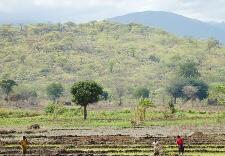Farmers in Tanzania lack access to affordable financial products, but a solution that combines climate analysis with business sense is changing that
The unavailability of financial products in some parts of the world can be striking. According to the most recent data from the World Bank, 30 per cent of adults globally are still considered unbanked. The lack of access to the most basic financial services, let alone the credit and insurance markets, makes achieving long-term financial goals or managing unexpected emergencies difficult.
Overcoming this requires products that are affordable, practical and, perhaps most importantly, financially sustainable for the companies that sell them. Work undertaken by Imperial Business School using an innovative parametric insurance model amounts to a significant breakthrough in providing credit to unbanked people.
Financial products for smallholder farmers
Building on his previous experience working for the World Bank designing micro and meso-insurance for smallholder farmers, Dr Erik Chavez led the development of an approach based on machine learning to design parametric insurance at large-scale. Together with Dr Enrico Biffis, both researchers at the Brevan Howard Centre for Financial Analysis at Imperial Business School, he led the fine tuning and deployment of the financial product designed specifically for smallholder farmers in Tanzania built on parametric insurance.
While typical insurance products pay out based on losses, parametric insurance pays out when specific conditions are met. A natural disaster parametric insurance product might pay if floodwaters in a location exceed a certain height, as opposed to a figure based on damage.
Using machine learning tools to analyse data such as weather variables, soil characteristics and agricultural practices to determine what ideal crop yields look like, the team was able to develop a set of criteria by which a farm’s performance could be judged.
A total of 30 per cent of adults globally are still considered unbanked
To confirm this could be used in a financially sustainable product, the team worked with global reinsurer Munich Re. Alexa Mayer-Bosse, Head of Business Development & Origination, Agro & Weather Risks at the firm, said, in the past, parametric insurance was in its infancy, which made for unsustainable products.
“The challenge was there to make it better, and so Imperial came along and said why not pull in all the available data and use the big computing to model it? This was a new approach, and as we were already in the market on various parametric products, we came to each other.”
Mayer-Bosse said that it can be challenging to combine academic research with business realities, but understanding expertise was the key to success.
“Once you go from the research to the business, there comes a lot more of which you have to tackle. I think Imperial is very well aware of that.”
Business productivity
The result was a combination loan and insurance product that allowed lenders to use the parametric insurance product as guarantee when extending credit to smallholder farmers, many of which were previously excluded from the financial system. If a crop failed due to poor weather conditions the insurance would cover the farmer's loss, thus helping them pay back their loan.
Two pilots undertaken between 2015 and 2017 saw 50,000 farmers take up the product, resulting in a total of $13 million being lent by banks as input loans and $5 million of insurance coverage channelled by a local insurer.
Private Agricultural Sector Support (PASS) is a Tanzanian trust that partially guaranteed the loans. Nicomed Bohay, Managing Director of PASS when the project was being undertaken, said the premiums were lower than other products on the market.
Using machine learning tools to analyse data such as weather variables... the team was able to develop a set of criteria by which a farm’s performance could be judged
“The premium was included in the financing structure of the small holder farmers loans from banks. This arrangement not only made this product competitive, but also affordable as it is built into the financing structure so farmers pay for their loans after the crops are harvested.”
Bohay said the access to credit allowed many farmers to almost double their income.
“Consequently, the farmers’ livelihoods improved, and they were able to meet their basic expenses such as education for their children, medical expenses, household food security, and improved housing,” Bohay said. “All of these are indications of poverty alleviation.”
With plans to expand the model to countries including Ghana, Uganda and Zimbabwe, many more could soon experience a similar improvement in financial security.

